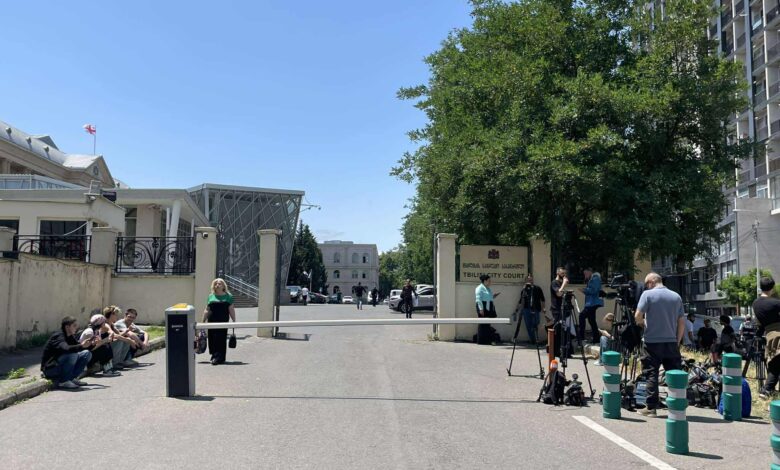
Journalists Face Coverage Hurdles as Court Recording Ban Takes Effect
Journalists with cameras were no longer allowed on the premises of the Tbilisi City Court on June 30, as new rules restricting photo, video, and audio recording, as well as live broadcasting from courtyards and courtrooms, took effect.
The legislative amendments, which the Georgian Dream parliament rushed through last week, allow only courts or court-authorized individuals to make video, photo, or audio recordings. For such recordings, as well as for live broadcasting, the media must obtain consent from the High Council of Justice, the supreme judicial oversight body.
“Leave the equipment out […] the law has already been enacted,” a bailiff is seen in a video by RFE/RL Georgian Service telling Mindia Gabadze, a photographer from the online outlet Publika, at the entrance to the Tbilisi City Court yard, turning him away.
Other TV crews and media workers with recording equipment were also kept outside the courtyard. “With cameras, they are not allowed into the courthouse or even near it in the yard,” Salome Chaduneli, a reporter for RFE/RL Georgian Service, wrote in a live blog that she organized in the comment section of the outlet’s Facebook post to cover a hearing of eleven protesters detained on group violence charges.
“Upon entering the courtroom, I was prohibited from taking my phone out of my bag to make an audio recording,” Chaduneli said. “The computer is the only device I can use to write about the main stories of court proceedings and then publish them here in the blog.”
Gabadze and Chaduneli are among the reporters who have extensively covered the court trials of detained protesters. The legislative amendments, which stripped them and their colleagues of recording rights in court and limited them to reporting only with words, were adopted as pretrial proceedings for dozens of protesters enter the closing phase, with final verdicts expected in July and August.
The trials of those whom many see as political prisoners have drawn high public interest, and videos from hearings – from defense arguments to witness testimonies – have widely circulated in traditional and social media. The hearing often took place amid tensions.
“We cannot take photos of police officer witnesses, so we cannot remember their faces,” Chaduneli wrote on Facebook. Witnesses have often been accused of giving false testimony. “…let alone the detainees, their families, and [the inability to capture] their nonverbal communication,” she added.
“We cannot capture their testimonies, their form of communication, their gestures, their style of speaking, the manner of their address [to the court,] the exchanges between lawyers and witnesses, the statements of the defendants, or the judges’ decisions,” she further said.
The reporter noted that journalists cannot follow witnesses to question them, cannot record audio to double-check their reporting, or capture any possible brawls in court. “This week, final rulings will be announced in at least two cases. We will not be able to film them,” she said.
“Their propaganda failed. They couldn’t achieve what they had in mind, so they decided to simply erase the information,” Publika quoted actor Andro Chichinadze, one of 11 detainees who may face four to six years in prison on group violence charges.
While the uncertainty over the rules has made work in the courts difficult for the critical broadcasters, there was no mention of the new restrictions and hurdles in the coverage of the pro-government channels and the Georgian Public Broadcaster, Mediachecker, a media monitoring group, observed.
Journalists were told by the Tbilisi City Court press service that the court was no longer authorized to grant media permission for recording, as that authority now rests with the High Council of Justice. Publica reported that journalists had contacted the HCoJ in advance to obtain consent but received no response.
They were also not allowed inside the HCoJ building later when they arrived to seek answers about how court coverage would proceed. Instead, HCoJ later issued a draft ruling instructing court bailiffs to ensure the “due execution” of the new reporting and broadcasting restrictions in courts.
Also Read:
- 03/06/2025 – Georgian Dream Targets Critical Broadcasters for Questioning Government Legitimacy
- 02/05/2025 – Georgia Falls 11 Places to 114th in RSF Press Freedom Index
- 12/03/2025 – Initiated Amendments to Law on Broadcasting Threaten Freedom of Media and Expression, SJC Warns